The thing is I don’t remember the first time I had a gun in my hands. It seems like something I should remember, some profound milestone to mark the passing from childhood to the mysterious realm of the adults. But…nothing. I do remember my father and his brother, Uncle Sonny, sitting on the porch of my grandparents’ ramshackle house in rural Mississippi, not far from the crossroads where bluesman Robert Johnson made his much-noted deal with the Devil, shooting .22 Shorts at a coffee can filled with sand. It was high summer, blazing hot, and both men were in white James Dean t-shirts and skin-tight Levi jeans with the legs rolled up. My father, who had killed men on some nameless island in the South Pacific, and my uncle, who ran moonshine in a big Pontiac sedan, were particular about their jeans.
The can was about 10 feet away — an amazing distance to a little kid! — at the base of the huge oak that dominated the dirt front yard. With each “pop!” of the little .22 revolver, a Ruger copy of an old cowboy single action, the can would jerk.
“You want to let him do it?” my uncle asked, nodding toward me. I was aching to get my hands on that gun, to feel the smooth grips and the little shock of recoil, to watch that can shiver as the tiny slugs hit it. I must have been five, maybe six, years old, and I’d cried when Brandon de Wilde yelled, “Shane! Come back! Come back, Shane!”
“Not yet,” my father said. “He can shoot just fine, but he can’t hit what he’s shooting at every single time.”
“Hell,” said my uncle the moonshine runner, “neither can I!”
Both men laughed, in the way I thought real men laughed when there wasn’t a mom around to tsk-tsk about profanity, a fellowship born of the blistering heat and the unmistakable smells of Hoppes-9 solvent and smokeless gunpowder. My father let me hold the little Ruger, but he didn’t let me pull the trigger. Even so, I’ve always counted that day as my initiation into the culture of guns…
My father’s guns were not particularly valuable. In firearms as in the rest of his life, he had an almost uncanny ability to seize the dross while letting the gold slip through his fingers. And in a way perhaps emblematic of the post-war years of the 1950s, he cherished a belief that more inevitably translated into better.
Still, the core of his collection — the guns I think of as my father’s guns — said a lot about a man who grew up in the northeast Mississippi woods, went to war and came back to a Memphis boomtown. There was, of course, a Winchester 30-30 lever action rifle, a direct descendent of the Gun that Won the West, the Winchester 1873 rifle, and the later Winchester 1892, made famous in the mitt-like hands of John Wayne in so many movies. Load the flat-point 30-30 rounds in the tubular magazine, work the lever just like a million cowboys movies showed you how, pull the trigger, and the small Tennessee whitetails fell. The “thurty-thurty” — no one in my family and maybe even the whole South actually called them “Winchesters” — was a workingman’s gun, a harvesting tool that hung on the walnut gunrack in the living room of our suburban Memphis house until the oaks and maples started showing their fall colors.
Equally prosaic was the “squirrel rifle,” a pump Winchester .22 popular in the shooting galleries at the Mid-South Fair every year. The Winchester was my grandfather’s gun, passed down in the hallowed Southern tradition from father to eldest son. “Hell, it’s really your gun, son, but you just don’t get it for a few more years,” my father told me year in and year out. But those years seemed infinitely long, so every fall when the state fair rolled around, I gathered up allowance money, whatever small change I could scrounge, and determined that I would win my own gallery gun, the grand prize at the fair’s shooting galleries. Five shots for a quarter, and if you grouped all your shots together and completely obliterated a small red star target, you won the gun.
I managed to win enough teddy bears, stuffed animal and doo-dads to fill Graceland to the brim, and in truth won that rifle a dozen times over except for the errant finger of the carney barker, who found the tiniest hint of red star each time. After years and probably hundreds of dollars in quarters, one of the carneys, all tattoos and a dangling cigarette, took pity on me.
“Son,” he said, “the teddy bears and all that crap are from the fair, but this here’s my rifle. You win it and it comes out of my pocket, then what am I gonna give my boy? But damn it all, you can shoot!”
Then there was the rifle my father made with his own hands, a Swedish Mauser bolt action that saw service in his war. He’d taken the old military rifle and following the instructions in a paperback book called “Converting Military Rifles,” its red cover creased and stained with lubes and solvents from the workbench, had turned the old military rifle into a “sporter” with a new walnut stock in the high comb Weatherby style, a turned-down bold handle and a new set of sights. He’d inlet a silver half-dollar coined in the year he was born into the stock, then rubbed the stock with coat after coat of oil until the finish was a deep and dark as a well.
He loved the rifles and his Remington semiauto shotgun, with its fat Cutts Compensator and adjustable choke and it’s shoulder-pounding 12-gauge recoil, but from the first my heart was captured by the handguns. Part of that reason for my choice of obsession was prosaic…the long guns were hunting tools, and my father never asked me to go hunting with him. I waited, begged, longed, for the invitation; smart, nerdy kid that I was, I’d read the great hunting books, the Hemingways and the Ruarks, listened with rapt attention to grandfathers and uncles and assorted members of the extended family, understood the natural progression of things in the South. I’d cleaned rabbits and quail and dove when the hunters came home; helped clean and oil the guns and waited, because my time was coming.
But it never came. My father…lost interest. The fights between him and my mother escalated, and he was gone on the road more and more. Many years later, I would get a call from a nice woman who told me she was my sister, a planned child, part of my father’s other family, all of half a block down the street. The sheer logistic considerations of it staggered me…two families separated by three houses.
My father had three handguns, the little Ruger .22 revolver, a second Ruger revolver, a .357 Magnum single action Blackhawk, referred to as a “Flat-top” because the top part of the gun’s frame was flat rather than humped to accommodate a larger sight, and a Remington Rand 1911 .45 semiauto, marked “U.S. Property.” The Remington Rand was a dark gun, a heavy thing of war and a remembrance my father never talked about. It was always loaded, seven fat 230-grain thumb-sized .45 in its black steel magazine. “Can’t hit a damn thing with it,” he said, or, occasionally, “Hit you in the finger and knock you flat on your ass!” Depended on the day.
The Flat-top was clearly his favorite, and when he’d first gotten the gun in the late 1950s, he’d taken me out to his workshop and taught me how to reload the .357 cartridges. The Magnum was essentially a longer version of the aging .38 Special, designed to drive a bullet faster and harder than any earlier handguns. But the cartridges were expensive, so my father reloaded his own.
He’d take the fired brass, which had expanded on firing, size it back down in a special die in a reloading press, replace the spent primer, add gunpowder, then top it off with a bullet that he’d made from soft lead wire pressed into a copper cup. The bullet was seated with another special die. I made my first .357 round when I was eight, and I thought it was just short of magic.
The less my parents paid attention to me, the more attention I paid to the Flat-top. My father’s reloads, and mine at first, were predicated on the idea that if the reloading manual said five grains of powder, six would no doubt be better. Seven better still. The Ruger bucked and roared with the heavy loads, fireballs flashing out the barrel as the gun ripped upward in recoil. “You like that gun,” my father said one day. “I’m good with it,” I replied. He laughed.
I carried the Flat-top in the woods whenever I could, in a cheap leather holster from the hardware store. Hardware stores still sold holsters, and guns, and ammo in those days. My grandfather, a serious bass fisherman along the Tennessee River, had launched himself into the breech left by my father and was convinced that I would follow in his angling footsteps. I dutifully learned the ins and outs of bass fishing, which lure in the morning and which in the evening, reading rivers and lakes, the art of precision casting…I hated it.
One day we were walking home, my grandfather and I, along the river after a day of many casts and no fish. It was Tennessee hot, the air as still and thick as a musty quilt, and my grandfather was talking about the Tao of Bass. We passed a shallow pool, and a lunker, call it four pounds or so, was laying up in the shallows, too sluggish to go deeper. As my grandfather started to say we’d have another chance at the old bass tomorrow, I pulled the Ruger, rolled the big hammer back and launched a 125-grain rocket into the pool. Then I plucked the very dead fish out of the water. My grandfather just shook his head.
“My son, I fear you are never going to a fisherman,” he said. “You and them damn pistols…” He let the thought dangle there, another ignored lure.
It’s a memory I cherish, because that was my last normal summer. The next year my beloved younger brother would complain of a nagging headache and 12 agonizing months later the brain tumor would kill him. What I know of grace, I learned from him in those endless hellish months. On the last day, I went into his bedroom, a room we’d shared before he took ill, touched his hand and told him I loved him. He smiled at me. Then I went to my high school and sat numbly in class, staring at the black chalkboard and waiting for the call I somehow knew would be coming that day.
My family…exploded. I suppose my father’s other family exploded as well, but I wasn’t in a position to know. My mother, always balanced on a knife edge of savage depression and manic intensity — bi-polar, we’d call it now, and know how to treat it — slipped off the edge into full blown crazy, rants and hysteria that even now I choose not to put to paper, all carefully hidden from the neighbors. Your mom’s cool, my school friends would say. My mom’s nuts, I would think in reply, but never say.
The guns were my refuge in those last years of high school, an endlessly fascinating study that took me away from the maelstrom my home life had become. I read the classics — Ed McGivern, Elmer Keith, Charles Askins, Skeeter Skelton — and poured over every word from Col. Jeff Cooper in the monthly Guns & Ammo magazines. In between Calculus and Advanced Placement English, I studied the art and science of pistolcraft — shooting and reloading, one hand versus two hands, the push-pull grip of the newly coined Weaver stance and Jeff Cooper’s radical Modern Technique of the pistol. Years later I would sit with an aged Col. Cooper in the basement gun vault at his home at the legendary GUNSITE Academy in Arizona, as close to a holy place as the mysterious alchemy of shooting would allow, and handle the blued steel icons of those times. “Hell, Michael,” the Colonel would say, “you were there for most of it.”
“But not the beginning,” I answered, remembering. “Not the beginning.”
My father simply disappeared into a world I could neither imagine or enter, a world of guilt and depression, alternating with epic battles with my mother. He worked for a pharmaceutical company, and the gravity of the “professional samples” and “courtesy prescriptions” held he and my mother in drug-induced thrall. I did what young men had done since time immemorial…I left. For college, for a career as a newspaper writer — “Your father and I so hoped you would amount to something,” my mother said when my first national bylines were appearing. “I guess we were wrong” — then magazines and on to books and eventually to television.
And I continued to shoot. I moved from plinking to formal competition; first “bullseye,” what people think of when someone says “target shooting,” trying to shoot small groups at concentric circles. But I was quickly drawn into the new sport created by Col. Cooper — “combat shooting,” an intricate dance of high-powered handguns, multiple shooting positions, targets at all ranges and athletic challenge. We shot modern copies of my father’s World War 2 1911 .45 pistol from swinging bridges, around complicated barricades, at targets as close as the muzzle of the gun and as far away as half a football field. We learned to reload on the run, to clear jams without ever breaking stride, to shoot from standing, kneeling, prone or any combination thereof, to analyze complex stages of fire and decide on a strategy in seconds. We fired more rounds in an average month than most people shooters in a lifetime.
I took as my mentors the last of the great pistol fighters, men who in law enforcement or the military had made their livings with guns, had faced other men with guns. I shot alongside legends, met my heroes, spent time with weapons designers and in factories, studied the history of firearms and the men who created them. I taught pistolcraft and self-defense, studied various and sundry martial arts from the Filipino knife dances to full-contact fighting — cold, damp mornings are a particular treat these days — participated in sports where the consequences of failure was death, then took those mindsets back to the range.
I remained cordial with my family, but distant. I suppose I could tell you about anger and recrimination and tears, ignored pleas for treatment and therapy, visits that ended abruptly, needles scattered around the house, all the bits and pieces of exploded lives; about the heart attack that took my mother as we were talking on the phone and my father’s third family and his all too brief journey back from, and the short slide back to, the lost world of the drugs and the depression, but I don’t suppose it matters all that much anymore.
Instead I’ll tell you one last story — indeed, the last story — about my father’s guns, and maybe about me. The inevitable call came when I was at a firearms trade show, signing autographs and studying the next year’s advances in weaponcraft…you may not know it, but guns are like cars, and there are new models every year, many of them still based on John Browning’s apparently ageless 1911 pattern.
My father had slipped into his final coma, and his new family said I need to come immediately. I fly to his bedside in a Memphis hospital, a nagging headache I can’t shake making the flight a endless misery. I go straight to the hospital, where I take his hand, shrunken and palsied from the hand I remembered on the little Ruger so many years ago. It’s okay, I tell him, I’m here, and you can go now. He dies that way, holding my hand. I do the things one does in times like that; shake hands with obscure relatives; stare at the body as if there is something to be learned, some truth I’ve overlooked…then I go to my father’s last home in rural Tennessee. By the way, my father’s wife casually mentions on the drive through the green, green fields of Tennessee in the summer, your father didn’t want you to have any of the guns. He gave them, she says, all to my grandson.
“Whatever,” I say, my head now an agony.
At the house, I mention to my father’s wife that I should clear all the guns, since my father invariably left everything loaded. “Oh no,” she says. “He told me everything was always kept unloaded. That was his absolute rule.” Without answering I walk to the old gun cabinet from our original house, pick a rifle at random — a Marlin lever action rifle — work the lever and pop a fat 45/70 cartridge onto the floor. “Oh my dear lord!” my father’s wife says. So I sit on the floor and methodically unload my father’s guns for the last time. Strangely, the important guns, the guns of my abbreviated youth, are all gone…the little Ruger, the Flat-top, the Winchester rifles, gone and replaced with dozens of “best buys,” “gunsmith specials” and flashy gold-plated “collectors’ items.” As I work, my father’s wife keeps pulling more guns from places they’d been secreted, in case, I suppose, I had decided to stage a raid on the place. Finally, at the very bottom of the gun cabinet, wrapped in dirty oilcloth, is my father’s 1911. I drop the magazine and there are the seven fat .45 ACP rounds with headstamps from the 1940s, as dark and dangerous as I remembered.
“I’m going to take this one,” I say, slapping the magazine back in and racking the slide to put a round in the chamber, my fingers unconsciously flicking on the thumb safety. There was a long pause from my father’s wife, perhaps I think caustically, as she calculates the dollar value of the old and obviously neglected warhorse.
“I guess that would be okay,” she says. “But nothing else.”
Back at my hotel that night, the .45 cocked and locked on the bedside table, I sit at the foot of the bed and hold my head in my hand. My right eye has swollen shut and the pain is literally nauseating. I think for a moment I am going to pass out from it. I finally decide to go to the nearby hospital emergency room, where I sit for four hours, waiting. When they finally examine me, a real doctor comes in and sits down across from my bedside. He looks worried.
“Do you,” he asks solicitously, “have a history of brain tumors in your family?”
No, I lie.
“The reason I ask is that your symptoms are consistent with a late-stage brain tumor, and we need to do an MRI immediately to see how far the tumor has advanced.”
I nod. After all, I’d heard it all before.
So they wheel me in and look inside my head. I sit in a small, cold examination room watching minutes pass, waiting for my death sentence. When I can bear it no longer, I call my girlfriend, my life’s partner, and tell her I am in trouble. “Why didn’t you call sooner?” she asks, in tears, and I can’t answer. “Just hang on,” she says, “I’m coming.”
At 2 AM a new doctor comes in. “You have a clean bill of health,” he says. “No tumor; you can go home now.” No harm; no foul. And he walks out. I stop him in the hall. “What about my head? The pain?” I say. “You’ll have to come back tomorrow,” he replies, handing me a prescription for painkillers. “The pharmacy’s closed, but there’s a 24-hour drugstore just down the street.”
A 24-hour drugstore in an urban war zone, I think, taking the prescription. It just keeps getting better. I take the script, go back to my hotel, pick up the cocked-and-locked pistol and stick it in the back of my waistband, Mexican carry, it’s called. Then I throw on a jacket to cover the gun and go to the drugstore. It is still steamy hot, and I am the only car in the lot when I go in. Just as I step out of the drugstore with the drugs in a small white bag and turn the corner to my car, a sleek oil-slick black shark separates itself from flow of traffic and cruises into the lot, blocking my retreat back into the drugstore. The windows of the shark roll down, and the ‘banger on the passenger’s side grins. He has one gold tooth right in the front of his mouth and Snoop Dog corn-rows.
“Whatcha got in the sack, little white boy?” he asks.
There are four of them, laughing, taunting. I feel the wall of the building behind my back, and the big pistol in my belt weighs a ton. Time begins to slow down, the highlights of the oil-slick black shark as sharp and unforgiving as hard, cold diamonds. The pain in my head is gone, and I can feel my breath, calm and measured. Not Snoop, I think absently in that time between seconds, the empty place between the stars. Snoop’s arm is hanging out the open window, and that’ll slow him down…Rear seat; driver side, because he’s leaning forward and I can’t see his hands…move left on the draw, toward the cover of my car…then Snoop and rear seat; passenger side…last rounds at the driver, because he’ll have to shoot around Snoop and he’ll be the slowest…
I am smiling; maybe I laugh, just a little. My right hand is in a firing grip on the 1911, but I still haven’t drawn. There is all the time in the world and here is where I will stand, all of us fixed in place, a simple urban tableau. Let’s do this, I say, or something like that. Let’s do this and go home. Snoop stares and finally breaks the spell. “You one crazy white boy,” he says, slapping the side of the black shark and laughing. “You have yourself a nice night, you hear?” And the shark pulls back into the flow of traffic.
I step to the car, breathing deeply as if I’ve been running hard; get in and lock the door; pull the 1911 from my belt. I start to put it on the seat next to me, and I am seized with a vision of a jungle, hot and muggy and smelling of decay…a terribly afraid young man, fresh from the country, trapped between his duty and his fear with the big .45 in his hand. He is shaking, and men are trying to kill him. He raises the 1911 and pulls the trigger, the gun bucking in his hand. A small yellow man clutches his stomach and bends over in pain. The young American pulls the trigger again and again, and tears roll down his face.
I take my hand off the .45, gingerly, as if it vibrates with a life of its own, as the flee-or-fight chemicals flood out of my body, and I finally find the tears for a man I never really knew.
POSTSCRIPT: The headache proves to be an attack of shingles, a legacy from childhood chickenpox, that takes much of the vision of my right eye, robbing me of the visual acuity that is the difference between a shooter and a marksman. And so I begin again, teaching my left eye to pick up the front sight, forcing my stance to adapt to the changes. Sometimes I think about the closing quote from Edmund O’Brien, Sykes, in the great western “The Wild Bunch”…Well, me and the boys here, we got some work to do. You wanna come along? It ain’t like it used to be, but, uh, it’ll do.
True enough.
— 30 —

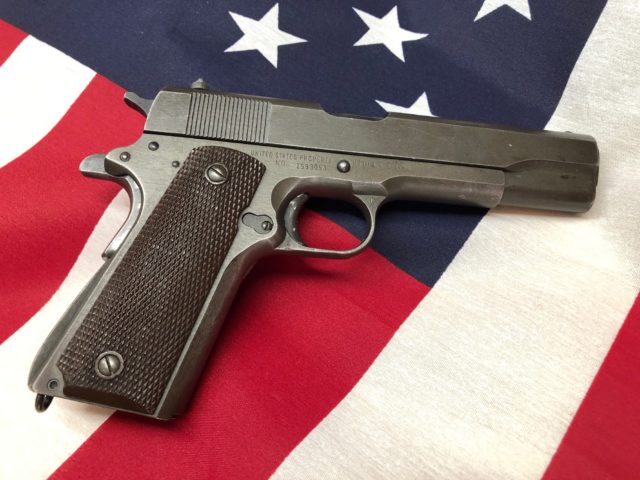
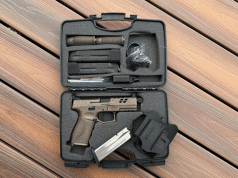
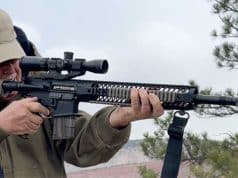
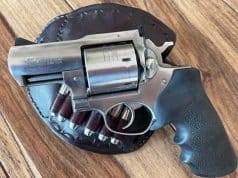
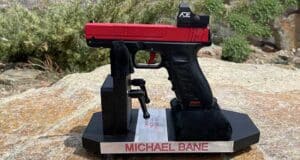
Great read, sir.
What a story.
Great read, glad it was “only” shingles and an eye.
Thanks for sharing the insight to yourself.
I can’t help but think there’s an Aaron Lewis song in there somewhere. Thanks for posting it again.
At least you got the one that counted. Thanks for sharing this part of your life with us.
Amazing story and writing. Thank you.
I sense I’m somehow better for reading this.
Thanks
Thanks, Michael.
I LOVED this essay. It’s one of the best things of yours that I’ve ever read. On the previous incarnation of this blog, I went so far as to copy/paste it into a file when you originally posted it, just in case, and I’ve read it a few time since. Glad to see your blog is up again, and with some great posts.
Thank you, Michael!
So glad to see this and to read it again. I imagine parts of it were tough to write. Thank you, Michael, for sharing this.
Great story. Thank you sir.
Very well written Mike. And very well lived for sure.
Thank you for sharing that Michael. It reminds us we aren’t alone.
Great story.
Thank you Michael.
“Who’d a thought?”
Great story Michael. Thanks for your honesty and ability in the gun world. At 76 years old, it makes me sit here a little while and think about some things in my life.
I ran across this and thought, while reading with great anticipation, that I could actually hear your voice speaking the words. Then I realized… you used to be a Bungalow Terracite! Happy travels, Michael!
Thanks for sharing. Appreciate your knowledge mad perspective over the years.
Thanks for sharing.
Holy hell that’s some raw story telling.
Thank you for the very personal background that you owed no one.
All I can muster here is a deeply heartfelt WOW!
This hurt so badly to keep reading that I wanted to stop … paragraph after paragraph after paragraph to the end.